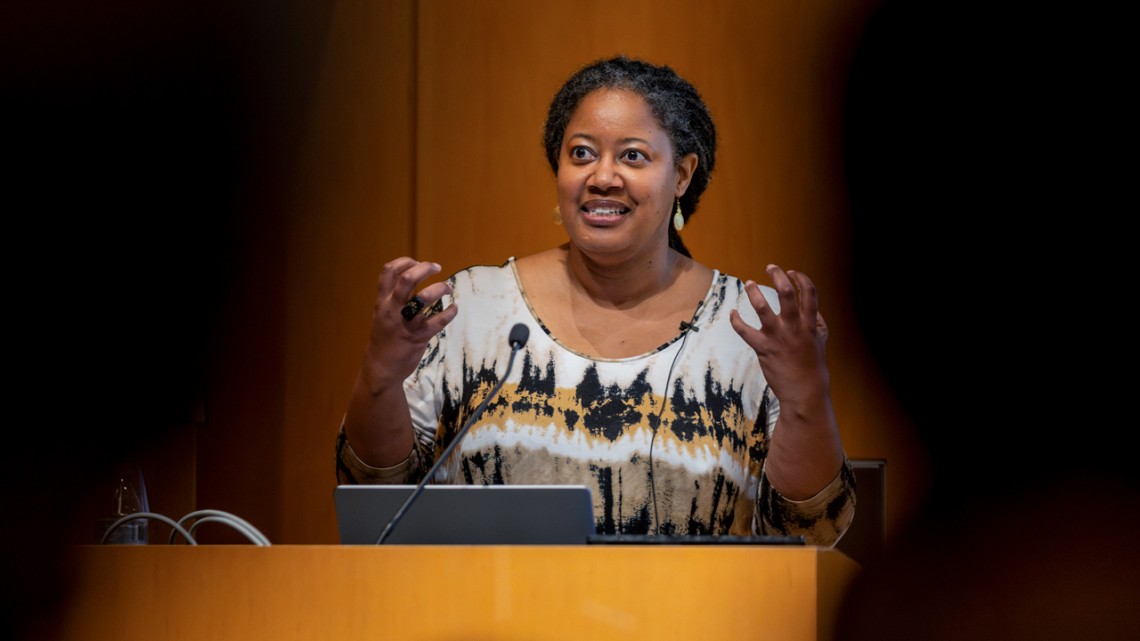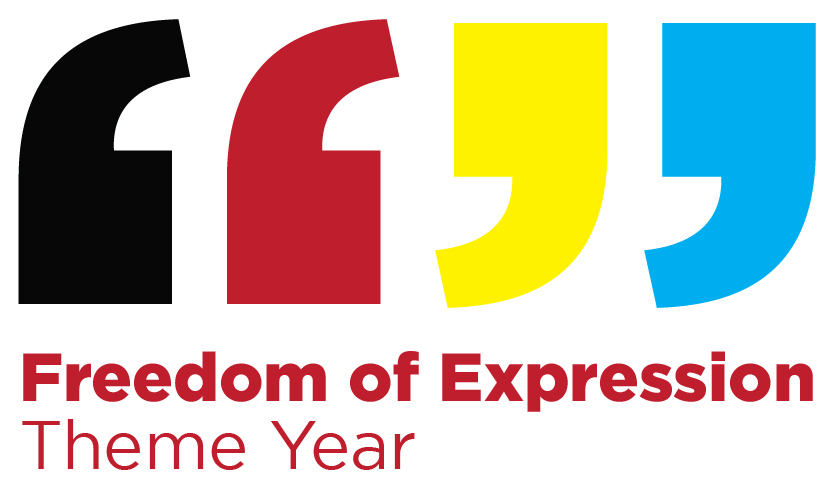
Author N.K. Jemisin speaks at the Bartels World Affairs Lecture Oct. 4 in in the Rhodes-Rawlings Auditorium.
Author Jemisin builds ‘the world from scratch’
By E.C. Barrett
People often ask N.K. Jemisin, award-winning fantasy author and critic, why she writes science fiction and fantasy as opposed to more “serious” fiction. She says she responds the same way trailblazing writer Octavia Butler did: because you can do anything in science fiction.
“If you are trying to reimagine the world, it’s a lot easier to do that when you can build the world from scratch,” Jemisin said. “There’s a misconception that these genres are about the future or the past, but they are about our present world – the fears and anger and responses to the present world of the writer. In building these other worlds, I am able to talk about the reality of ours.”
Jemisin spoke at the Bartels World Affairs Lecture, hosted by the Mario Einaudi Center for International Studies, on Oct. 4 in the Rhodes-Rawlings Auditorium. Her talk focused on how to investigate our world and beliefs about it, and how to use what we learn to imagine and construct a better future. She signed students’ copies of her most popular book, “The Fifth Season,” and other novels at a reception following the event.
Jemisin recounted writing “The Fifth Season” as she watched tanks rolling down the streets of Ferguson, Missouri, in response to protests over the police killing of Michael Brown. “I was processing the fact that this is a country that hates us so much that they don’t even want to hear us say: ‘Stop killing us,’” she said. “I was processing it and a lot of my anger showed up in the story.”
“The Fifth Season” is the first book in Jemisin’s Broken Earth trilogy, which won three consecutive Best Novel Hugo awards – a first in the history of the award. Her work frequently investigates themes of resistance to oppression and political revolution, and has also received Nebula and Locus awards.
Vice Provost for International Affairs Wendy Wolford, the Robert A. and Ruth E. Polson Professor of Global Development in the College of Agriculture and Life Sciences, said Jemisin’s world-building made her the perfect choice to kick off Cornell’s new Global Grand Challenge: The Future, organized and supported by Global Cornell.
“With this challenge we invite all of you – students, staff and faculty – to step back from the immediate questions of your studies, your work and your research, and deploy your imagination to sketch the real-world steps that would be needed to achieve an alternative future,” Wolford said. “If we are imagining other worlds and other futures, we are going to need all of the voices, all of the perspectives, and all living creatures at the table.”
In her talk, Jemisin walked audience members through her process of inventing worlds by studying the ways in which ours was – and continues to be – constructed through choices that reflect our values.
“There have been cultures in our world that do not consider anyone expendable, for example. That is strange to us in America today, because we’re used to treating some of our population as unimportant,” Jemisin said. “Our society is built around the possibility for everyone to become stupendously wealthy. There are societies that have different priorities than that. Maybe we should learn from some of them.”
Jemisin ended with a call to the audience to become better readers and editors of our world, using their observations to push back against targeted efforts to winnow down who counts as human, whose voices deserve to be heard and who gets to shape the future.
After the lecture, Jemisin sat down for a panel discussion with Global Grand Challenge co-chairs Anindita Banerjee, associate professor of comparative literature, College of Arts and Sciences (A&S); John Albertson, professor of civil and environmental engineering, Cornell Engineering; and Kaushik Basu, the Einaudi Center’s Carl Marks Professor of International Studies and professor of economics in A&S.
In response to a question from Bannerjee about what she would say to young people in the audience, Jemisin replied: “The younger people in this room get it. It’s an innate part of youth to question our reality, whether the way we live makes any sense, and if we should keep doing it.”
Jemisin had a 20-year career working with college students as a career counselor. “One of the reasons I do events like this,” she said, “is so I can come and talk with young people and retain my youthful questioning. They are right to question reality. The rest of us need to keep doing that.”
The Einaudi Center’s Bartels World Affairs Lecture brings distinguished international figures to campus each academic year to speak on global topics and meet with Cornell faculty and students, particularly undergraduates. The lecture and related events are made possible by the generosity of Henry E. Bartels ’48 and Nancy Horton Bartels ’48.
E.C. Barrett is a freelance writer for Global Cornell.
Media Contact
Abby Kozlowski
Get Cornell news delivered right to your inbox.
Subscribe

